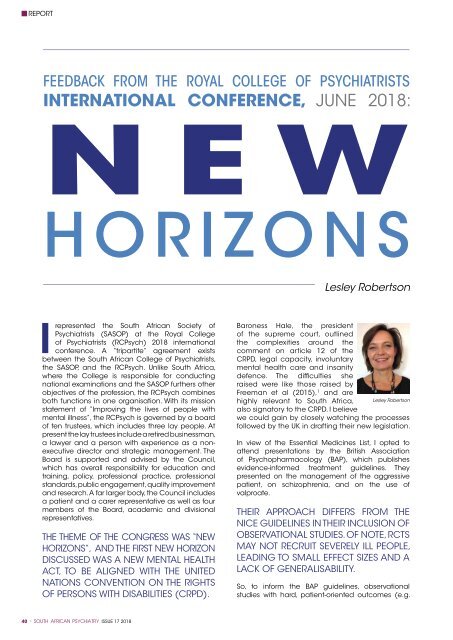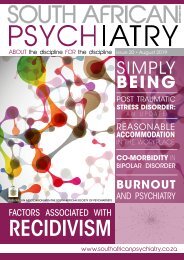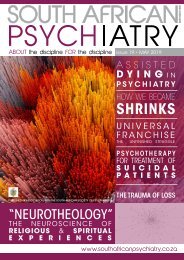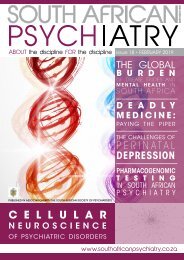South African Psychiatry - November 2018
South African Psychiatry - November 2018
South African Psychiatry - November 2018
You also want an ePaper? Increase the reach of your titles
YUMPU automatically turns print PDFs into web optimized ePapers that Google loves.
REPORT<br />
FEEDBACK FROM THE ROYAL COLLEGE OF PSYCHIATRISTS<br />
INTERNATIONAL CONFERENCE, JUNE <strong>2018</strong>:<br />
NEW<br />
HORIZONS<br />
Lesley Robertson<br />
I<br />
represented the <strong>South</strong> <strong>African</strong> Society of<br />
Psychiatrists (SASOP) at the Royal College<br />
of Psychiatrists (RCPsych) <strong>2018</strong> international<br />
conference. A “tripartite” agreement exists<br />
between the <strong>South</strong> <strong>African</strong> College of Psychiatrists,<br />
the SASOP, and the RCPsych. Unlike <strong>South</strong> Africa,<br />
where the College is responsible for conducting<br />
national examinations and the SASOP furthers other<br />
objectives of the profession, the RCPsych combines<br />
both functions in one organisation. With its mission<br />
statement of “Improving the lives of people with<br />
mental illness”, the RCPsych is governed by a board<br />
of ten trustees, which includes three lay people. At<br />
present the lay trustees include a retired businessman,<br />
a lawyer and a person with experience as a nonexecutive<br />
director and strategic management. The<br />
Board is supported and advised by the Council,<br />
which has overall responsibility for education and<br />
training, policy, professional practice, professional<br />
standards, public engagement, quality improvement<br />
and research. A far larger body, the Council includes<br />
a patient and a carer representative as well as four<br />
members of the Board, academic and divisional<br />
representatives.<br />
THE THEME OF THE CONGRESS WAS “NEW<br />
HORIZONS”, AND THE FIRST NEW HORIZON<br />
DISCUSSED WAS A NEW MENTAL HEALTH<br />
ACT, TO BE ALIGNED WITH THE UNITED<br />
NATIONS CONVENTION ON THE RIGHTS<br />
OF PERSONS WITH DISABILITIES (CRPD).<br />
Baroness Hale, the president<br />
of the supreme court, outlined<br />
the complexities around the<br />
comment on article 12 of the<br />
CRPD, legal capacity, involuntary<br />
mental health care and insanity<br />
defence. The difficulties she<br />
raised were like those raised by<br />
Freeman et al (2015), 1 and are<br />
highly relevant to <strong>South</strong> Africa, Lesley Robertson<br />
also signatory to the CRPD. I believe<br />
we could gain by closely watching the processes<br />
followed by the UK in drafting their new legislation.<br />
In view of the Essential Medicines List, I opted to<br />
attend presentations by the British Association<br />
of Psychopharmacology (BAP), which publishes<br />
evidence-informed treatment guidelines. They<br />
presented on the management of the aggressive<br />
patient, on schizophrenia, and on the use of<br />
valproate.<br />
THEIR APPROACH DIFFERS FROM THE<br />
NICE GUIDELINES IN THEIR INCLUSION OF<br />
OBSERVATIONAL STUDIES. OF NOTE, RCTS<br />
MAY NOT RECRUIT SEVERELY ILL PEOPLE,<br />
LEADING TO SMALL EFFECT SIZES AND A<br />
LACK OF GENERALISABILITY.<br />
So, to inform the BAP guidelines, observational<br />
studies with hard, patient-oriented outcomes (e.g.<br />
40 * SOUTH AFRICAN PSYCHIATRY ISSUE 17 <strong>2018</strong>

















